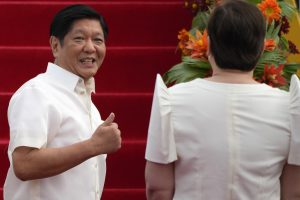Immediately after the resignation last week of Philippine Vice President Sara Duterte as education secretary and vice chairperson of the government’s anti-communist task force, her supporters claimed that she had just become the leader of the country’s opposition.
Duterte has not commented on this, but opposition parties balked at the idea and pointed out that the vice president has to be made accountable for her use of the controversial confidential funds in 2022. She is also being implicated in the brutal “war on drugs” unleashed by the previous government of Rodrigo Duterte, her father.
Despite her resignation from the Cabinet of President Ferdinand Marcos Jr., Duterte will remain vice president until 2028. Since the vice president is elected separately from the president, it is not unusual for the former to be part of the opposition. In fact, the country’s former vice president was the leader of the opposition during the Duterte administration.
Sara Duterte’s resignation did not surprise the public since her family has been actively criticizing the leadership of Marcos for several months now. A veteran lawmaker accurately noted that the departure of Duterte from the Cabinet “ends with finality the increasingly tenuous partisan relations between the Duterte and Marcos political power blocs.”
Perhaps Duterte should have made her clean break with the ruling coalition when she resigned as party chairperson in May 2023. At the time, she complained against “political toxicity” and “execrable political power play” without mentioning anyone. Yet, she remained in the Cabinet and continued to support the “unity government” led by Marcos.
When it was exposed that she accessed confidential funds and allegedly spent 125 million pesos in just 11 days, she doubled down on her budget request and accused her critics of being “enemies of the state.” After Congress realigned the fund item to law enforcement agencies, her father accused the house speaker, who is a first cousin of Marcos, of planning to run for president in 2028.
Afterward, the Duterte patriarch mobilized supporters to oppose the constitutional amendment plan of the Marcos administration. He even called the president a drug addict. In response, Marcos allies questioned Duterte’s “gentleman’s agreement” with China on the South China Sea, which they believe undermined the country’s long-term security interests
When Sara Duterte’s brother called for Marcos to resign, she said it was uttered as an act of “brotherly love.” Duterte’s participation in “prayer rallies” calling for the ouster of Marcos was noticed by the First Lady, who publicly aired her disappointment against the vice president in April.
It was clear that the ruling coalition would break apart, and this finally materialized when Duterte announced her resignation from the Cabinet. But aside from bolting out from her party, Duterte now has fewer allies to depend on. Her father’s influence is also being challenged since the International Criminal Court could soon issue an arrest warrant against him.
According to former House Speaker Pantaleon Alvarez, resigning from the Cabinet could be a good step forward for the vice president. “She now has more options insofar as how she can move in pursuit of serving the people, without the shackles imposed upon her by those who made it appear that they are willing to work with her but, at the same time, setting up traps along the way to make sure that she fails,” Alvarez said.
He added that Duterte can lead the opposition and “serve as the check and balance against the shortcomings, and overextensions, of the Marcos administration.”
But for members of the minority in Congress, the suggestion is “unbelievable and unacceptable.” They said that Duterte has yet to make a statement that is aligned with the people’s clamor for social justice and human rights protection.
Former Senator Leila de Lima, who was viciously persecuted and detained under the Duterte administration, explained why the vice president is not fit to lead the opposition. “There was no acceptance of responsibility, or change of principles and stances when she resigned,” she said. “How can someone become the opposition if they haven’t been made accountable?”
As supposed leader of the opposition, Duterte has to work with various political formations in order to be effective in challenging the policies of the Marcos government. As it stands now, she will find it extremely difficult to connect with genuine and credible opposition forces since the majority have been victims of her father’s repressive administration.
































